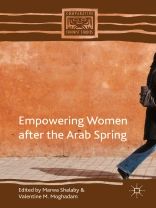With studies on the United Arab Emirates, Qatar, Syria, Lebanon, Morocco and Tunisia, this collection presents a theoretical framework on the study of women’s empowerment amid the transformations that have shaped the social and political fabrics of Arab societies.
विषयसूची
Introduction: Deconstructing Women’s Empowerment in the Middle East and North Africa.- 1 Domestic Violence Laws in the U.A.E: A Religious Argument for Criminalizing Domestic Violence.- 2 Contextualizing the Legal Change: Addressing Normative Paradigms and the Constraints on Equal Rights for Women in the Arab World.- 3 Kin-Based Values and Attitudes Towards Gender Equality in Morocco and Egypt.- 4 No Agency Without Grassroots Autonomy: Exploring a Framework for Evaluating the Substance of Women’s Political Inclusion across the Kingdoms of Jordan, Bahrain, and Morocco.- 5 What Islamic Feminists Want: Lessons from the Kuwaiti Experience.- 6 Interest and Exposure?Based Explanations for Egalitarian Attitudes in the Arab World.- 7 Syrian and Syrian Palestinian Women in Lebanon: ‘Actors of Citizenship’?.- 8 Post Arab Spring Transformations: In Need of Feminine Politics.- 9 Women and Democracy after the Arab Spring: Theory, Practice and Prospects.
लेखक के बारे में
Marwa Shalaby is the Fellow for the Middle East and Director of the Women’s Rights in the Middle East Program at James A. Baker III Institute for Public Policy at Rice University, USA. Her research focuses on comparative politics and research methodology, with a concentration on Middle Eastern politics, gender politics, and democratization.
Valentine M. Moghadam is Director of the International Affairs Program, and Professor of Sociology, at Northeastern University, USA. Born in Tehran, Iran, Dr. Moghadam studied in Canada and the U.S. She is the author of Modernizing Women: Gender and Social Change in the Middle East (1993, 2003, 2013), Globalizing Women: Transnational Feminist Networks (2005, winner of the American Political Science Association’s Victoria Schuck Award), and Globalization and Social Movements: Islamism, Feminism, and the Global Justice Movement (2009, 2013).












